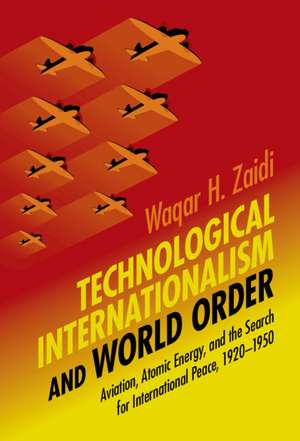Technological Internationalism and World Order: Science in History
Autor Waqar H. Zaidien Limba Engleză Paperback – 22 mar 2023
| Toate formatele și edițiile | Preț | Express |
|---|---|---|
| Paperback (1) | 230.49 lei 6-8 săpt. | |
| Cambridge University Press – 22 mar 2023 | 230.49 lei 6-8 săpt. | |
| Hardback (1) | 585.10 lei 6-8 săpt. | |
| Cambridge University Press – 2 iun 2021 | 585.10 lei 6-8 săpt. |
Din seria Science in History
-
 Preț: 274.69 lei
Preț: 274.69 lei - 9%
 Preț: 593.40 lei
Preț: 593.40 lei - 9%
 Preț: 592.89 lei
Preț: 592.89 lei -
 Preț: 406.55 lei
Preț: 406.55 lei -
 Preț: 283.25 lei
Preț: 283.25 lei -
 Preț: 189.98 lei
Preț: 189.98 lei -
 Preț: 306.86 lei
Preț: 306.86 lei -
 Preț: 306.30 lei
Preț: 306.30 lei -
 Preț: 324.96 lei
Preț: 324.96 lei -
 Preț: 324.24 lei
Preț: 324.24 lei -
 Preț: 224.62 lei
Preț: 224.62 lei -
 Preț: 243.15 lei
Preț: 243.15 lei -
 Preț: 288.42 lei
Preț: 288.42 lei -
 Preț: 221.56 lei
Preț: 221.56 lei -
 Preț: 206.39 lei
Preț: 206.39 lei - 11%
 Preț: 584.57 lei
Preț: 584.57 lei - 11%
 Preț: 585.10 lei
Preț: 585.10 lei - 14%
 Preț: 728.56 lei
Preț: 728.56 lei - 11%
 Preț: 642.35 lei
Preț: 642.35 lei - 11%
 Preț: 243.95 lei
Preț: 243.95 lei
Preț: 230.49 lei
Nou
Puncte Express: 346
Preț estimativ în valută:
44.11€ • 45.79$ • 36.78£
44.11€ • 45.79$ • 36.78£
Carte tipărită la comandă
Livrare economică 24 martie-07 aprilie
Preluare comenzi: 021 569.72.76
Specificații
ISBN-13: 9781108819190
ISBN-10: 1108819192
Pagini: 314
Dimensiuni: 152 x 229 x 17 mm
Greutate: 0.42 kg
Editura: Cambridge University Press
Colecția Cambridge University Press
Seria Science in History
Locul publicării:Cambridge, United Kingdom
ISBN-10: 1108819192
Pagini: 314
Dimensiuni: 152 x 229 x 17 mm
Greutate: 0.42 kg
Editura: Cambridge University Press
Colecția Cambridge University Press
Seria Science in History
Locul publicării:Cambridge, United Kingdom
Cuprins
Introduction: machines of peace; 1. Invention, interdependence, and the lag: conceptualizing international relations in the age of the machine; 2. Controlling scientific war: international air police and the reinvention of disarmament; 3. The shape of things to come: aviation, the League of Nations, and the transformation of world order; 4. Air power for a United Nations: the international air force during the Second World War; 5. Wings for peace: planning for the postwar internationalization of civil aviation; 6. A battle for atomic internationalism: United States and the international control of atomic energy; 7. A blessing in disguise: Britain and the international control of atomic energy; Conclusion: science, technology, and internationalism into the Cold War and beyond.
Recenzii
'In his profound and thoroughly researched study of how the coming of aeroplanes and the atomic bomb inspired new thinking about global peace through the international control of these inventions, S. Waqar H. Zaidi offers a masterclass in how the history of internationalism should be written.' Joseph Maiolo, author of Cry Havoc: How the Arms Race Drove the World to War, 1931-194
'The bomber and the bomb changed the world, but how did they change thinking about international society? Zaidi's brilliantly original study, places military technologies at the heart of the history of 20th-century internationalism. Connecting the interwar period with the Cold War, it will be essential reading for anyone interested in understanding both the ambition and the frustrations of the internationalist project.' Adam Tooze, author of Crashed: How a Decade of Financial Crises Changed the World
'Weaving together the histories of aviation and atomic energy, Zaidi makes innovative contributions to scholarship on technology and internationalism. He deftly analyzes how policymakers and intellectuals, on both sides of the Atlantic, sought to transform the airplane and the atomic bomb into catalysts of global order rather than global catastrophe.' Jenifer Van Vleck, author of Empire of the Air: Aviation and the American Ascendancy
'The bomber and the bomb changed the world, but how did they change thinking about international society? Zaidi's brilliantly original study, places military technologies at the heart of the history of 20th-century internationalism. Connecting the interwar period with the Cold War, it will be essential reading for anyone interested in understanding both the ambition and the frustrations of the internationalist project.' Adam Tooze, author of Crashed: How a Decade of Financial Crises Changed the World
'Weaving together the histories of aviation and atomic energy, Zaidi makes innovative contributions to scholarship on technology and internationalism. He deftly analyzes how policymakers and intellectuals, on both sides of the Atlantic, sought to transform the airplane and the atomic bomb into catalysts of global order rather than global catastrophe.' Jenifer Van Vleck, author of Empire of the Air: Aviation and the American Ascendancy
Notă biografică
Descriere
Explores the place of science and technology in international relations through early attempts at international governance of aviation and atomic energy.
